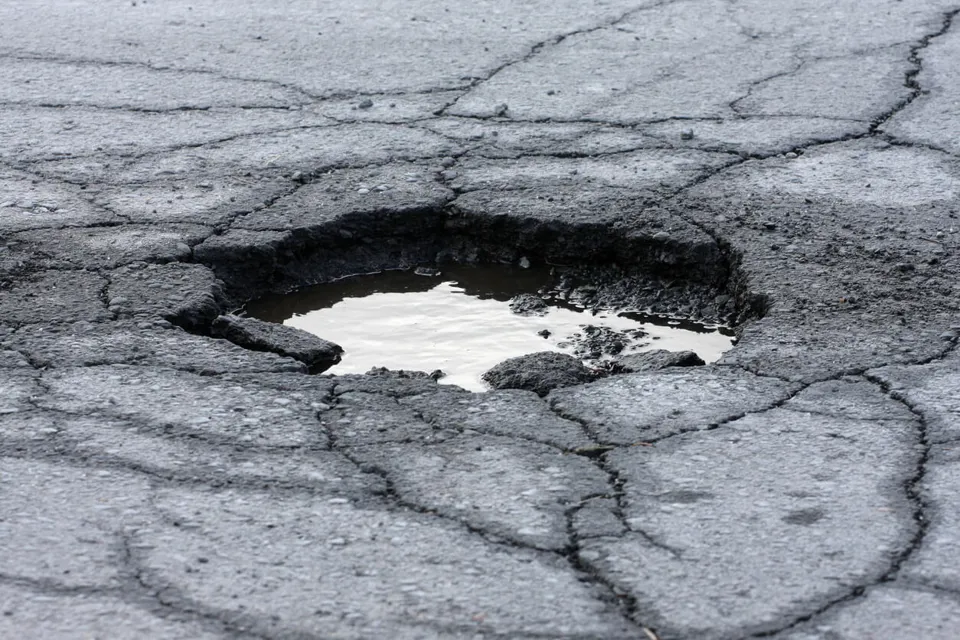The number of pothole insurance claims for the first four months of 2018 already equals those placed for the entirety of last year, with an average repair bill of £1,000, data from the AA reveals.
Based on the AA's share of the car insurance market, it estimates that there had been more than 4,200 claims for pothole damage by the end of April. With an estimated average repair bill of around £1,000, that comes to £4.2 million, or more than £1m per month, it says.
Janet Connor, director of AA Insurance, said: "In most cases the damage caused by a pothole, such as a ruined tyre or two and perhaps a wheel rim, doesn't justify making an insurance claim, due to the policy excess and the potential loss of your no claims discount. So the claims we are seeing are clearly much worse than that."
The growing problem has led to the AA urging fleet managers to advise their drivers on how to avoid potholes to prevent downtime and vehicle damage.
The AA puts the average repair bill at £1,000, while according to MotorEasy’s database of 30,000 warranty customers, axle and suspension damage is one of the most common causes of repair claims in relation to pothole damage.
Last year, its most expensive suspension claim was recorded by a Range Rover Sport at £3,863. This was closely followed by £3,528 for an Audi Q7 and £2,729 for a Mercedes-Benz E-Class.
Stuart Thomas, director of fleet and SME services at the AA, said: “Typically, fleet drivers clock up more miles each year than the average driver, due to the distances they cover across the UK. Equally, they are more likely to encounter potholes on unfamiliar routes.”
Thomas advises fleets to share best practice driving safety tips with drivers on the road. He said: “Keep your distance from cars in front, in case they swerve or brake suddenly due to a pothole. This will give you a clear view of the road surface ahead. If you see a pothole, slow down and steer to avoid driving over it if possible.”
Thomas says it is also important not to swerve suddenly or brake sharply, as that could cause an even bigger accident.
“In the future, technology will be key to providing a solution to identifying road surface issues, with connected car technology alerting drivers to potential route hazards,” added Thomas. “It is something the AA is looking to develop through its Car Genie product.”
The AA has recently launched it the Flag it, Fund it, Fill it campaign which encourages people to photograph and report potholes.
Connor said: "Potholes can appear almost overnight and it's really important to 'flag it' to the highway authority responsible so that they're aware it exists."
Councils have a statutory defence against paying out compensation for damaged cars if they're not aware of a pothole.
"I would call on drivers to safely photograph the potholes they encounter and send them to the responsible highway authority and the Department for Transport by social media, to show them the extent of the pothole problem," continued Connor.
"We're also calling on the Government to 'fund it' by ring-fencing 2p per litre of current fuel duty to create a £1bn pothole fund, specifically for local councils so they can get on top of their pothole problem.
"With that funding, councils can then 'fill it' and make their local roads safe for all road users."
Cash-strapped councils reported that more than 24,400 miles of road are identified as needing essential maintenance in the next year, according to this year’s Annual Local Authority Road Maintenance (ALARM) survey, published in March.
Local authorities in England and Wales report that the gap between the funds they received and the amount they actually needed to keep the carriageway in reasonable order was almost £556m – a shortfall of £3.3m for every authority. And, it would now take 14 years – up from 12 years in 2016/17 – to get local roads back into a reasonable steady state, provided adequate funds and resources were available.
The transport secretary, Chris Grayling, announced in March a further £100m to help repair any potholes and other storm damage. The cash was on top of £75m in Government funding already given to councils from the Pothole Action Fund this year, as well as the additional £46m boost for highways authorities announced just before Christmas.





















Login to comment
Comments
No comments have been made yet.